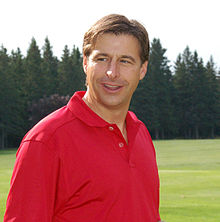Shawn Graham
| Shawn Michael Graham | |
|---|---|
 |
|
| 31st Premier of New Brunswick | |
|
In office October 3, 2006 – October 12, 2010 |
|
| Monarch | Elizabeth II |
| Lieutenant Governor |
Herménégilde Chiasson Graydon Nicholas |
| Preceded by | Bernard Lord |
| Succeeded by | David Alward |
| Member of the New Brunswick Legislative Assembly for Kent |
|
|
In office October 19, 1998 – March 11, 2013 |
|
| Preceded by | Alan Graham |
| Succeeded by | Brian Gallant |
| Personal details | |
| Born |
February 22, 1968 Rexton, New Brunswick |
| Political party | Liberal |
| Spouse(s) | Roxane Reeves |
| Religion | Anglican |
| Signature | |
Shawn Michael Graham (born February 22, 1968) is a Canadian politician, who served as the 31st Premier of New Brunswick. He was elected leader of the New Brunswick Liberal Party in 2002 and became premier after his party captured a majority of seats in the 2006 election. After being elected, Graham initiated a number of changes to provincial policy especially in the areas of health care, education and energy. His party was defeated in the New Brunswick provincial election held September 27, 2010, and Graham resigned as Liberal leader on November 9, 2010.
Graham was born in Rexton, New Brunswick, Canada and raised in a political family, with his father Alan R. Graham being the longest serving member of the Legislative Assembly of New Brunswick. The family has ancestral homes in the communities of Rexton and Main River with roots going back to the early 19th century. Shawn Graham was born the year after his father's first election as MLA for Kent County, New Brunswick.
Graham graduated from the University of New Brunswick, as an alumnus of both Harrison House and Neill House, after which he completed an education degree at St Thomas University in Fredericton. Graham spent much of his career before entering elected politics working for the province's civil service and when his father resigned from the legislature in 1998, Shawn Graham was elected to replace him in a by-election called by Premier Camille Theriault as a member of the Liberal Party. Following the general election of 1999, the Liberals were reduced to 10 seats from 45, and by early 2001 they were down to 7 seats following the resignation of several former cabinet ministers. This gave the young politician the chance to rise to prominence.
...
Wikipedia
